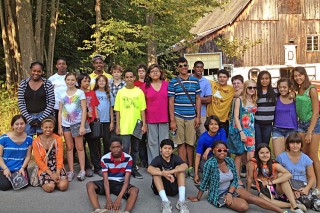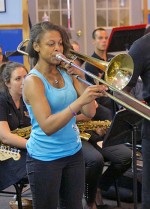Title

Summer MAP campers
(Photo by Educational Outreach Office)Summer camp.
Body
For those who’ve been, there are probably few phrases in the English language more resonant with memory and association. Fresh air, new friends, canoeing, lanyards, poison ivy, shirts and skins, color wars, secret crushes, bug juice.
Thanks to Juilliard’s partnership with the Edmond de Rothschild Foundations, this year, for 49 fortunate young people enrolled in Juilliard’s Music Advancement Program (MAP), “summer camp” also meant “music.” The inaugural Summer MAP enabled these students to become campers for three weeks at French Woods, a renowned performing arts camp in Hancock, N.Y., at the base of the Catskill Mountains. Most MAP students come from families who cannot afford to send them to any camp, much less one as premiere as French Woods, so this grant provided a life-changing opportunity.
MAP started in 1991, and its leaders have long wanted to have a summer program for MAP kids so that they could “preserve and develop the skills they’ve learned over the year,” said Teresa McKinney, Juilliard’s director of educational outreach. “We were very glad that the Rothschild Foundations recognized the potential value of the camp experience for these talented young people.”
Led by a group of 10 Rothschild Summer MAP fellows (all Juilliard music students) at French Woods, Summer MAP campers were able to enhance their musical skills, reflect upon what it means to be an artist in today’s world, and enjoy the full gamut of the camp experience. Especially the food. But we’ll get to that later.
French Woods unites young people from around the world who are passionate about the arts. While they lived and ate with the rest of the campers, the Summer MAP participants also had a few daily music experiences that were unique to them. They joined one or more instrumental ensembles, including concert band, symphony orchestra, chamber orchestra, or jazz band; and they each took private lessons with either the French Woods faculty members or the Rothschild fellows. “Because the camp environment didn’t have many distractions—especially from social media—I had more of an opportunity to immerse myself in music and other activities that I loved,” said camper Natalie Anantua, 15, a piano student from Queens.
The MAP group was also united each day by an interactive curriculum inspired by Juilliard President Joseph W. Polisi’s vision of the artist as citizen: a Citizenship and the Arts course that imparted awareness of the importance of social engagement, arts advocacy, volunteerism, and leadership. “The Summer MAP campers came to realize that, as artists, they not only form a community but that as a community they have greater power to affect others,” observed Rebecca Reuter, Juilliard’s assistant director of educational outreach. Outside of their musical pursuits Summer MAP campers could participate in arts, sports, and recreational activities including theater, magic, ceramics, horseback riding, and cooking.
Which brings us back to food. For those who remember camp food as consisting of woolen hamburgers or doubtful stews, the cooks at French Woods, who fed nearly 1,000 campers every day, seem to have been culinary magicians. In the newspaper produced by the Summer MAP campers, this reporter found no fewer than four references to the excellence of the cuisine.
But of course the experience of summer camp is about more than food (no matter how good it might be) or Capture the Flag, Sadie Hawkins dances, or bonfires. Summer camp is about learning about oneself and others; it’s about change. Reflecting on her time in Summer MAP, Natalie concluded, “I used to think that people who said things like ‘French Woods changed my life!’ were just trying to please their superiors, but I can truly say that I have come from my camp experience a better musician and a better person.” And as Karen Carney, the mother of a 16-year-old trombonist from Brooklyn, wrote, “Maya went from being a very shy, soft-spoken, serious musician to a very self-confident and vibrant entertainer. Camp has opened a whole new world of possibilities for her.”





